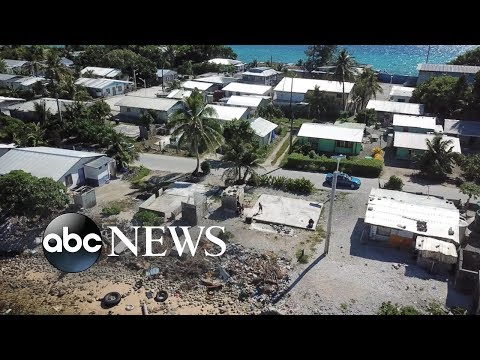
Nestled in the central Pacific Ocean, the Marshall Islands is a picturesque nation comprising over 1,000 individual islands and islets organized into 29 coral atolls. It has a population of approximately 53,000 people, many of whom live on Majuro and Ebeye – two of its most populous islands. Known for its rich marine biodiversity and vibrant culture, this nation’s very existence is under threat due to climate change, making it emblematic of the acute challenges faced by low-lying island countries worldwide.
#### Rising Seas and the Climate Crisis
The primary existential threat to the Marshall Islands is global sea-level rise, driven by climate change. The average elevation of the islands is only about two meters above sea level, rendering them extraordinarily vulnerable to even slight rises in ocean levels. Scientists predict that if current trends continue, large portions of the Marshall Islands could be submerged by the end of this century.
The implications are dire: loss of habitat, salinization of freshwater resources which would jeopardize agriculture and potable water supplies, destruction of infrastructure, and potential obliteration of entire communities. Moreover, higher seas increase the islands’ susceptibility to storm surges that exacerbate these impacts further.
#### Erosion and Environmental Degradation
Apart from rising waters, coastal erosion poses an immediate risk. Natural protective barriers such as coral reefs are under threat from ocean acidification and warming waters leading to coral bleaching. This degradation reduces their effectiveness as natural breakwaters that protect against wave action that can cause significant erosion on shorelines.
Furthermore, environmental degradation linked to human activity aggravates these vulnerabilities. Waste management struggles on many atolls have led to pollution problems which negatively impact marine ecosystems that are crucial for both food security and physical protection from oceanic forces.
#### Socio-Economic Impact
Should significant displacement occur due to these environmental changes, it would not only be a humanitarian crisis but also a complex socio-economic challenge. Most Marshallese rely on subsistence farming and fishing for their livelihoods; migrations would therefore disrupt available labor pools and exacerbate poverty rates.
Education systems and healthcare services could collapse or be severely strained if populations were forced to evacuate en masse. Traditional knowledge systems—passed down through generations about navigation, fishing practices, agriculture—risk being lost if communities disperse widely across distant locales.
#### Legal Implications
On an international scale, there’s an impending legal dilemma concerning statehood when a country becomes uninhabitable or loses significant territory due to natural disasters exacerbated by climate change. The question arises: what becomes of the displaced peoples’ rights under international law if their home state ceases to physically exist?
The Marshallese government has been vocal in international forums about these impending crises—demanding stronger action on climate policy globally while exploring radical alternatives such as building artificial islands or reinforcing existing ones.
#### A Call for Global Action
The plight of the Marshall Islands demonstrates one of our era’s most pressing paradoxes: nations least responsible for climate change bear its greatest burdens. As such massive global efforts are essential in addressing these challenges through mitigation strategies like sharply reducing greenhouse gas emissions worldwide and adaptation measures specifically tailored towards enhancing resilience in vulnerable regions like the Marshall Islands.
As we continue advancing into this century unmindful consumption patterns from more industrialized nations threaten not just remote corners but potentially entire cultures rooted for millennia in specific geographies like those found in Pacific atolls. It impels us upon moral ground besides ecological necessity: To act now ensuring future generations inherit a world where no nation fears extinction simply because others failed them.
